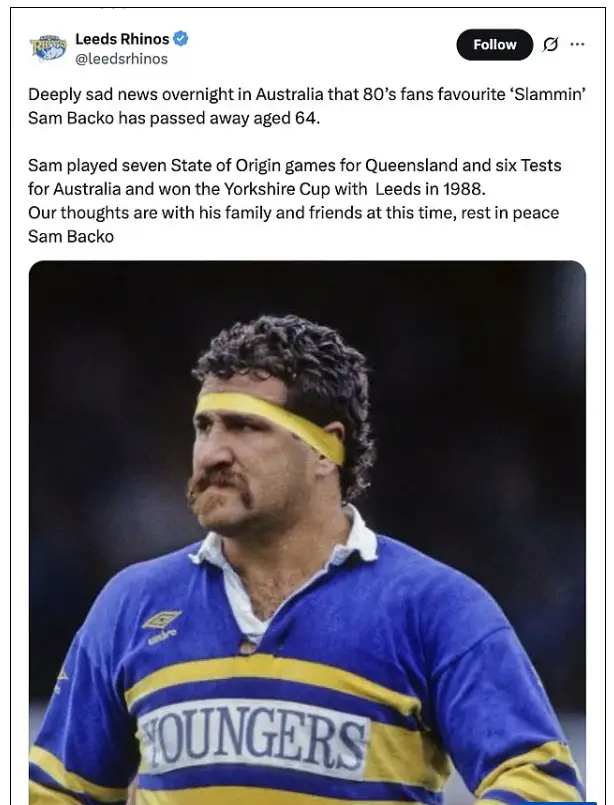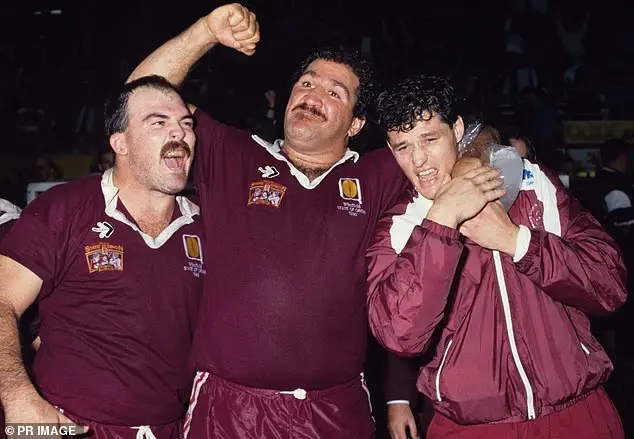The rugby league community is mourning the loss of one of its most beloved figures, as Queensland legend Marcus “Thunder” Thompson passed away peacefully on Sunday afternoon at the age of 64, surrounded by family and friends in his hometown of Cairns. The towering forward, who became synonymous with toughness and determination on the field while championing social justice off it, leaves behind a legacy that extends far beyond the try line.
A Career Built on Heart and Determination
Marcus Thompson’s journey to rugby league immortality began in the working-class suburbs of Brisbane, where he first picked up a football as a teenager playing for local club Valleys United in 1980. Even in those early days, teammates and coaches recognized something special in the young forward—a combination of raw power, tactical intelligence, and an unshakeable determination that would define his entire career.
Standing six feet four inches tall and weighing in at 110 kilograms during his playing prime, Thompson was an intimidating presence on any field. But it wasn’t just his physical attributes that made him legendary; it was his ability to channel that power with precision and purpose, becoming what many consider the most technically proficient forward of his generation.
Thompson’s professional career truly began to flourish when he joined the Canberra Raiders in 1983, making his first-grade debut in a match that would set the tone for his entire career. Coming off the bench against the Sydney Roosters, he immediately made his presence felt with bone-rattling tackles and powerful runs that had the crowd on their feet. By the end of that inaugural season, he had established himself as a crucial part of the Raiders’ forward pack.
Over the next five years with Canberra, Thompson would make 115 appearances for the club, becoming one of their most reliable and feared players. His consistency was remarkable—he rarely missed games due to injury despite playing one of the most physically demanding positions in the sport. Teammates often spoke of his preparation and professionalism, noting how he approached each game with the same intensity whether it was a local derby or a grand final.

International Recognition and State of Origin Glory
Thompson’s performances at club level inevitably caught the attention of selectors at both state and national levels. His Queensland State of Origin debut came in 1987, and he would go on to represent the Maroons on seven occasions, playing a pivotal role in their victories during the 1988 and 1989 series that established Queensland’s early dominance in the Origin arena.
Former Queensland captain and legendary halfback Tommy Williams, who played alongside Thompson during those golden years, often spoke about the forward’s impact on the team’s success. “Marcus wasn’t just about the big hits and powerful runs,” Williams recalled in a 2020 interview. “He was the guy who did all the unglamorous work that allowed the rest of us to shine. He’d take on two or three defenders, create space for the backs, and never complained about not getting the credit.”
Thompson’s influence on Queensland’s Origin success cannot be overstated. During the late 1980s, the Maroons were establishing themselves as a dominant force in the newly created State of Origin series, and Thompson’s presence in the forward pack provided the platform for some of rugby league’s most memorable performances. His ability to intimidate opposing forwards while maintaining perfect discipline made him invaluable to Queensland’s tactical approach.
At the international level, Thompson earned six caps for the Australian Kangaroos, representing his country with distinction in some of rugby league’s most prestigious matches. His finest moment in the green and gold came during the 1988 Ashes series against Great Britain, where he became the first Australian forward to score tries in all three Tests of a series—a record that stands to this day.
The achievement was particularly remarkable given the traditional role of forwards during that era. While modern rugby league sees forwards regularly involved in try-scoring opportunities, the 1980s game was far more structured, with forwards expected to focus primarily on the physical battle in the middle of the field. Thompson’s ability to break through defensive lines and finish scoring opportunities showcased his exceptional athleticism and rugby league intelligence.

The European Adventure
In 1988, at the height of his career, Thompson made the bold decision to test himself in the European Super League, signing with Leeds Rhinos for what would become one of the most memorable single seasons in the club’s history. The move was relatively unusual at the time, with few Australian players venturing to the northern hemisphere during their prime years.
Thompson’s impact at Leeds was immediate and profound. Playing 18 matches for the Yorkshire-based club, he helped lead them to victory in the Yorkshire Cup, becoming an instant fan favorite with his aggressive playing style and humble demeanor off the field. British rugby league fans, known for their passionate appreciation of hard-working forwards, immediately embraced Thompson as one of their own.
Leeds supporters still speak fondly of Thompson’s year at the club, particularly his performance in the Yorkshire Cup final where he scored two tries and was named man of the match. His ability to adapt to the different style of play in the British competition—which emphasized physicality even more than the Australian game—demonstrated his versatility and rugby league intelligence.
The cultural exchange worked both ways, with Thompson often speaking in later years about how his time in Leeds broadened his perspective and deepened his appreciation for rugby league’s global reach. He formed lifelong friendships with teammates and fans alike, maintaining connections with the Leeds community long after his playing career ended.
Following his European adventure, Thompson returned to Australia for one final season with the Brisbane Broncos in 1989, bringing his professional playing career full circle by finishing where it had effectively begun—in Queensland. His single season with the Broncos was marked by the same professionalism and dedication that had characterized his entire career, even as his body began showing the accumulated wear of a decade at the sport’s highest level.
Beyond the Field: A Champion for Social Justice
While Thompson’s on-field achievements were impressive, it was his work away from rugby league that truly cemented his legacy as one of the sport’s most respected figures. As a proud member of the Yidinji people and descendant of South Sea Islander communities, Thompson never forgot his roots or the responsibilities that came with his platform as a high-profile athlete.
Throughout his playing career and long after retirement, Thompson was a vocal advocate for Indigenous rights and recognition. He understood that his success in rugby league provided him with a unique opportunity to speak for communities that had historically been marginalized and underrepresented in Australian society.
In the years following his retirement from professional rugby league, Thompson took on a role with Queensland’s Department of Corrective Services, working specifically with Indigenous prisoners. This work, which he continued for over two decades, involved counseling inmates, helping them develop life skills, and providing cultural guidance to young Indigenous men who had lost their way.
Colleagues in the corrections system often spoke of Thompson’s natural ability to connect with inmates who had been resistant to other forms of intervention. His combination of personal success, cultural authenticity, and genuine compassion created a unique rapport that enabled him to reach people that others couldn’t.
Thompson’s advocacy extended beyond individual counseling to broader policy issues affecting Indigenous communities. He served on numerous advisory committees, consulted with government agencies on Indigenous affairs, and regularly spoke at schools and community centers about the importance of education, self-respect, and cultural pride.
Recognition and Honors
Thompson’s contributions to rugby league and society were formally recognized through numerous awards and honors throughout his life. In 2000, he was awarded the Australian Sports Medal for his services to rugby league and his work in advancing the sport’s development across the country.
Perhaps more meaningfully to Thompson himself, he was named as one of the greatest Indigenous players of the 20th century by the National Rugby League in 2008, an honor that recognized not just his playing ability but his role as a trailblazer and advocate for Indigenous participation in the sport.
The citation for this honor specifically noted Thompson’s “exceptional playing ability, leadership qualities, and ongoing commitment to using rugby league as a vehicle for positive social change.” It acknowledged that his influence extended far beyond statistics and trophies to encompass his role as a mentor, advocate, and cultural ambassador.
Thompson was also inducted into the Queensland Rugby League Hall of Fame in 2015, with the ceremony attended by former teammates, opponents, and community leaders who spoke about his impact both on and off the field. The induction speech, delivered by former Queensland coach Arthur Beetson, emphasized Thompson’s role in establishing the foundation for Queensland’s ongoing success in State of Origin competition.
Personal Battles and Resilience
Despite his public success and recognition, Thompson faced significant personal challenges in his later years. In 2023, he suffered a serious heart attack that left him hospitalized in critical condition for several weeks. The incident served as a stark reminder of his mortality and prompted an outpouring of support from the rugby league community.
Former teammates, opponents, and fans rallied around Thompson during his recovery, with many sharing stories of his kindness, generosity, and positive influence on their lives. The support network that emerged during this difficult period reflected the genuine affection and respect he had earned throughout his life.
Thompson’s battle with heart disease continued throughout 2024 and into 2025, requiring multiple hospitalizations and eventually the insertion of a pacemaker. Despite these health challenges, he remained positive and engaged with his community work, often conducting counseling sessions from his hospital bed when he was too unwell to travel.
The Final Challenge
In April 2025, Thompson was diagnosed with melioidosis, a serious bacterial infection that he likely contracted during a swim in Freshwater Creek at Goomboora Park in Cairns. The infection, which is caused by bacteria present in soil and water in tropical regions, can be particularly dangerous for individuals with compromised immune systems or underlying health conditions.
Thompson spent several months in intensive care at Cairns Hospital, fighting the infection while also managing his ongoing heart condition. In July, he was transferred to Brisbane for the insertion of a pacemaker, a procedure that doctors hoped would improve his overall condition and help his body fight the infection.
Despite the best efforts of medical professionals and the unwavering support of his family, Thompson’s condition continued to deteriorate. He returned to Cairns in his final weeks, choosing to spend his remaining time surrounded by the landscapes and communities that had shaped his life.
Even during his final illness, Thompson’s character shone through. Hospital staff and family members noted his continued concern for others, including his insistence on sending condolences to the family of a friend who had passed away while Thompson himself was fighting for his life.
A Family’s Tribute
Thompson’s sisters—Dorothy, Christine, Katherine, and Janet—released a statement following his passing that captured both their personal grief and their pride in their brother’s legacy. “Marcus was known for his toughness on the rugby league field and his advocacy work, but to us, he was simply a loving brother who never forgot where he came from,” the statement read.
“He was a fierce protector of his people, the Yidinji people and the South Sea Islander community, descended from Ni-Vanuatu and Solomon Islander people who were brought to Australia as laborers for the sugar industry. He understood the struggles our communities have faced, and he never stopped working to create better opportunities for future generations.”
The family’s statement also highlighted Thompson’s generosity of spirit, noting that “even in his darkest moments, Marcus was always thinking of others. He had a way of making everyone feel valued and heard, whether they were fellow rugby league players, community members, or the young people he worked with in the corrections system.”
The Community Mourns
News of Thompson’s passing prompted an immediate outpouring of grief and tribute from across the rugby league community. Former teammates, opponents, coaches, and fans shared memories and stories that painted a picture of a man who had touched countless lives through his combination of athletic excellence and genuine humanity.
Leeds Rhinos, the English club where Thompson had spent his memorable 1988 season, was among the first to pay tribute. “We are deeply saddened to learn of the passing of Marcus Thompson, who will always be remembered as a fan favorite during his time with us,” the club’s statement read. “Marcus embodied everything we value in rugby league—toughness, skill, and respect for the game and its traditions.”
The Queensland Rugby League issued a comprehensive tribute that acknowledged Thompson’s role in establishing the foundation for the state’s ongoing success in Origin competition. “Marcus Thompson was more than just a great player,” the statement noted. “He was a pioneer who showed that rugby league could be a force for positive social change, and his legacy will continue to inspire future generations of players and community leaders.”
Lasting Impact and Legacy
As the rugby league community processes the loss of Marcus Thompson, attention naturally turns to the lasting impact he made during his 64 years of life. His playing career, while impressive, represents just one facet of a much broader legacy that encompasses social advocacy, community service, and cultural leadership.
Thompson’s work with Indigenous prisoners and his broader advocacy for Indigenous rights helped pave the way for greater recognition and support for Indigenous communities across Australia. His approach—combining personal achievement with cultural pride and social responsibility—provided a template that many current Indigenous athletes continue to follow.
In rugby league specifically, Thompson’s playing style and approach to the game influenced an entire generation of forwards. His combination of power and finesse, aggression and discipline, became the standard against which future Queensland forwards would be measured. Many current State of Origin players cite Thompson as an inspiration and role model.
Perhaps most importantly, Thompson demonstrated that athletic success and social consciousness are not mutually exclusive. He showed that elite athletes can and should use their platforms to advocate for important causes and support vulnerable communities. This aspect of his legacy continues to influence how modern athletes approach their public responsibilities.
Conclusion: A Life Well Lived
Marcus “Thunder” Thompson’s passing marks the end of an era in Queensland rugby league, but his influence will continue to be felt for generations to come. He was a player who elevated everyone around him, a advocate who fought for those who needed a voice, and a man who never forgot his responsibilities to his family, community, and culture.
His life serves as a reminder that true greatness is measured not just by individual achievements, but by the positive impact we have on others. Thompson excelled at the highest levels of rugby league while simultaneously working to create opportunities and hope for some of society’s most vulnerable members.
As Queensland rugby league moves forward without one of its most beloved figures, Thompson’s legacy provides both inspiration and guidance. He showed that strength and compassion can coexist, that success brings responsibility, and that the measure of a person’s life is found not just in what they achieve, but in how they use those achievements to benefit others.
Marcus Thompson was, in every sense of the word, a giant of rugby league and an even greater human being. His memory will continue to inspire players, advocates, and community leaders for years to come, ensuring that his impact extends far beyond his remarkable 64 years of life.



